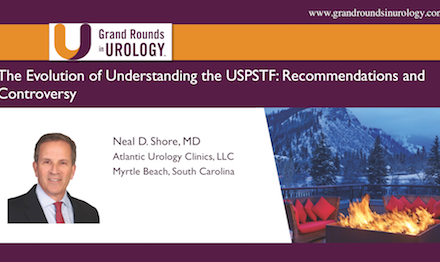Brian T. Helfand, MD, PhD, presented “Overview of the State of Genetic Testing and Future Applications in Prostate Cancer” during the 32nd International Prostate Cancer Update on March 7, 2022, in Snowbird, Utah.
How to cite: Helfand, Brian T. “Overview of the State of Genetic Testing and Future Applications in Prostate Cancer.” March 7 2022. Accessed Apr 2024. https://grandroundsinurology.com/overview-of-the-state-of-genetic-testing-and-future-applications-in-prostate-cancer/
Overview of the State of Genetic Testing and Future Applications in Prostate Cancer – Summary
Brian T. Helfand, MD, PhD, Chief of the Division of Urology and the Ronald L. Chez Family and Richard Melman Family Endowed Chair at NorthShore University HealthSystem in Evanston, Illinois, discusses current and potential future applications of genetic testing in prostate cancer screening and treatment. He explains that genetic testing has applications throughout the patient journey. At the prevention and screening stage, genetic testing can determine which men will benefit from screening. At the diagnosis stage, it can determine which men will benefit from biopsy. During early-stage disease, genetic testing can help identify which men will benefit from definitive treatment. Finally, during late-stage disease, genetic testing can identify the men that will benefit from advanced therapies. Dr. Helfand notes that there are two kinds of genetic testing, germline and somatic, and not all tests are relevant at all stages of the patient journey. He then gives an overview of germline genetic testing’s role in screening, arguing that because family history, rare pathogenic mutations (RPMs), and genetic risk score (GRS) all measure risk independently, a comprehensive inherited risk assessment should include all three tools. Dr. Helfand particularly focuses on GRS, defining it as a number calculated based on the cumulative variation across multiple single nucleotide polymorphisms (SNPs), which is then used to provide an estimate of disease risk. He notes that GRS is simple to interpret and more informative than family history. Dr. Helfand also observes that GRS is correlated with number and laterality of tumor cores. GRS, he argues, is useful for risk stratification for both screening and active surveillance. He notes that RPMs can help with stratification in terms of disease aggressiveness. Dr. Helfand concludes by arguing that genetic testing for prostate cancer will be pivotal in the future and should be included in guidelines for both prevention and screening.
About The 32nd Annual International Prostate Cancer Update:
The International Prostate Cancer Update (IPCU), founded in 1990, is a multi-day CME conference focused on prostate cancer treatment updates with expert, international faculty. It is led by expert physicians and is designed for urologists, medical oncologists, radiation oncologists, and other healthcare professionals involved in the diagnosis and treatment of prostate cancer. Dr. Helfand delivered this educational activity during the 32nd iteration of the meeting in March 2022 in Snowbird, Utah.




